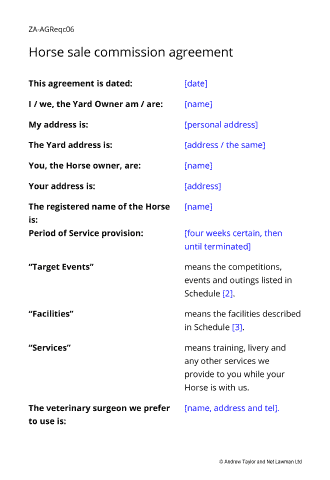Horse sale commission agreement

Document overview


- Length:12 pages (3430 words)
- Available in:
 Microsoft Word DOCX
Microsoft Word DOCX Apple Pages
Apple Pages RTF
RTF

If the document isn’t right for your circumstances for any reason, just tell us and we’ll refund you in full immediately.

We avoid legal terminology unless necessary. Plain English makes our documents easy to understand, easy to edit and more likely to be accepted.

You don’t need legal knowledge to use our documents. We explain what to edit and how in the guidance notes included at the end of the document.

Email us with questions about editing your document. Use our Lawyer Assist service if you’d like our legal team to check your document will do as you intend.

Our documents comply with the latest relevant law. Our lawyers regularly review how new law affects each document in our library.
About this horse sale commission agreement
This agreement is between a livery yard owner who agrees to take commission on the sale of a horse, and the owner. As written, like any livery contract, the owner also pays for livery while the horse is for sale and has personal access to the yard's facilities.
Sellers often prefer to sell the horse from a yard. The yard may have superior facilities in which to allow the seller to demonstrate the horse's ability, riders on hand who can get the best out of the horse, and surroundings that impress buyers; and the owner doesn't need to spend time answering questions, or arranging and attending viewings.
The deal should, however, like any business transaction, be recorded in a document that covers all the points. Writing it down not only protects both sides from later disagreement about what the terms were, but also protects the yard owner's livery business, in that the yard owner has recourse to the horse owner if something goes wrong (such as the horse damages his stable). Additionally, the terms of the livery are recorded, which not only gives the horse owner an expectation of additional costs on top of the sale commission, but also sets out the obligations of the horse owner.
When to use this document
Although yard owners are more likely to want to set the terms of the agreement (and thus use this template), a horse owner could also use this document to gain more favourable terms with a seller who does not have a standard sale agreement.
Although this document is drawn to protect the yard owner's interests as strongly as possible, the draftsman has also considered what your clients will think when you send it to them. Although it is written in non-legalistic language, the legal effect isn't reduced. However, horse owners will not worry that they have to see a solicitor before they sign. If you feel that some of the strictest suggestions we have made are too strong, you can soften them.
Agreement features and contents
Key features of this agreement include:
- The yard owner can choose to evaluate the horse before accepting the instruction to sell
- A choice of alternative commission arrangements including fixed sum and percentage of the sale price
- The procedure for selling is covered in full
The contents of this agreement include:
- Identification of the parties to the contract
- The agreement
- Owner warranties regarding the health of the horse and lack of vices
- Obligations of the owner
- Arrangements regarding failure to pay fees
- Horse owner's indemnification
- Care and sale of the horse
- Payment after a vet's certificate
- Commission on sale
- Disclaimers and limitation of liability
- Veterinary and medical call out
- Termination
- Safety
- Miscellaneous legal provisions
- Schedule 1: details about the horse
- Schedule 2: livery arrangements and costs

Choose the level of support you need
Document Only
This document
Detailed guidance notes explaining how to edit each paragraph
Lawyer Assist
This document
Detailed guidance notes explaining how to edit each paragraph
Unlimited email support - ask our legal team any question related to completing the document
- Review of your edited document by our legal team including:
- reporting on whether your changes comply with the law
- answering your questions about how to word a new clause or achieve an outcome
- checking that your use of defined terms is correct and consistent
- correcting spelling mistakes
- reformatting the document ready to sign
All rights reserved
